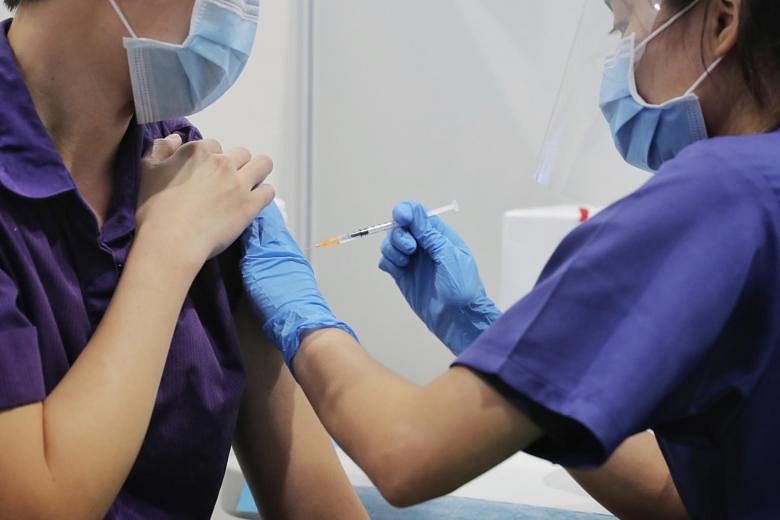SINGAPORE - The two vaccines Singapore is using will protect significantly, but not absolutely, against all current variants of the coronavirus that causes Covid-19, say experts. To what extent, however, is where they do not agree.
The Ministry of Health said last week that all three Covid-19 variants of concern (VOCs) - strains that could cause the most harm - as well as the two variants of interest (VOIs) behind the massive surge in cases in India, have been found in community transmissions here. VOIs have the potential to become VOCs.
The three VOCs - the B117 UK variant, P1 Brazilian variant and B1351 South African variant - are of concern because they spread more easily. Though they may not cause more severe illness, there are worries that vaccines might prove less effective against them.
The B16172 Indian variant was found in three clusters: the Tan Tock Seng Hospital (TTSH) cluster, Immigration and Checkpoints Authority officer cluster, and the Tuas South community care facility cluster. Three people in a household had another Indian variant, B16171.
The discovery that these five variants have been circulating here, even on a small scale, has raised concerns and is likely one reason for the more stringent measures that came into effect at the weekend.
But the two mRNA vaccines used here - Pfizer-BioNTech and Moderna - can provide an effective shield against such variants, say experts.
Professor Ooi Eng Eong from Duke-NUS Medical School, who is involved in the development of an mRNA vaccine, is confident there is "no significant loss in efficacy" in such vaccines against the variants seen today.
But Professor Hsu Liyang, an infectious diseases consultant at the National University of Singapore's Saw Swee Hock School of Public Health, argues there is not enough data to support that position.
While agreeing with Prof Hsu, Dr Sebastian Maurer-Stroh, executive director of the Agency for Science, Technology and Research's Bioinformatics Institute, said: "We are talking only about slight reduction in efficacy."
Professor Dale Fisher, a senior infectious diseases consultant at the National University Hospital, said: "We should simply regard them all as a threat."
Several TTSH staff who have been vaccinated are among the more than 40 people infected in the cluster. But they appear to be either asymptomatic, or only mildly or moderately ill.
The experts again reminded that even at their best, the vaccines provide 95 per cent protection against severe illness. They do not totally prevent infection, and there will also be the occasional breakthrough cases of severe illness, and even death.
Prof Hsu said a 5 per cent reduction in efficacy may sound like a small number, but it "translates into significant numbers if the virus is more efficient at transmitting".
Dr Asok Kurup, chair of the Academy of Medicine's Chapter of Infectious Disease Physicians, added: "It is crucial that we get vaccination out faster and to more people, because it protects against severe disease and death, no matter the variant.
"It is the outcome which matters the most. We will continue to see cases of breakthrough, but for the most part, these will be asymptomatic infection or mild disease."
The pandemic has seen a dramatic drop in influenza, which used to kill about 600 people a year here. In comparison, there have been 31 deaths in relation to Covid-19.
Prof Hsu said Singapore has to decide what is an acceptable number of infections and deaths.
"Cases, clusters and deaths are unavoidable over the next few years unless we have border controls that will impact our economy drastically," he said.
"So we will need a conversation about what are acceptable costs for Singapore."












